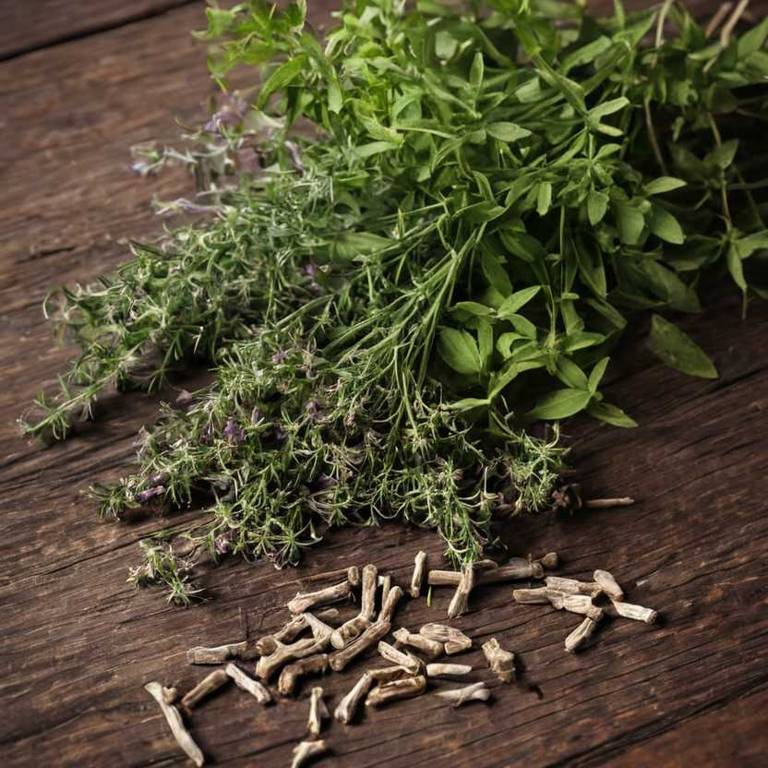By Leen Randell
Updated: Jul 06, 2024
10 Health Benefits Of Glycyrrhiza Glabra (Licorice)

Glycyrrhiza glabra, also known as licorice, has health benefits such as anti-inflammatory and antioxidant properties.
The saponins, flavonoids, and glycosides present in this plant help to soothe digestive issues and reduce stress. Its benefits include improved liver and adrenal function, enhanced immune system, and reduced symptoms of anxiety and depression. Individuals with chronic fatigue, fibromyalgia, and adrenal fatigue can experience improved energy levels and overall well-being.
Additionally, licorice root tea has been used to aid in weight management and improve skin health.
This article explains in details the 10 best health benefits of Glycyrrhiza glabra.
1. Reduces inflammation
Glycyrrhiza glabra reduces inflammation because of its unique composition of bioactive compounds.
The plant's main active ingredient, glycyrrhetic acid, inhibits the production of pro-inflammatory cytokines and enzymes, thereby preventing the onset of inflammatory responses. Additionally, licorice extract has been shown to exhibit antioxidant properties, scavenging free radicals and reducing oxidative stress that can contribute to inflammation.
These mechanisms collectively contribute to its anti-inflammatory effects, making it a valuable natural remedy for various inflammatory diseases.
2. Soothes stomach ulcers
Glycyrrhiza glabra soothes stomach ulcers because of its anti-inflammatory and antioxidant properties.
The root extract has been shown to reduce inflammation in the gut, which is a common symptom of stomach ulcers caused by H. pylori bacteria or acid reflux.
Additionally, licorice contains compounds that have been found to protect the mucous lining of the stomach, reducing the risk of damage from stomach acid and enzymes.
3. Clears respiratory infections
Glycyrrhiza glabra clears respiratory infections because of its antimicrobial properties.
The root extract has been shown to inhibit the growth of bacteria, viruses, and fungi that cause respiratory illnesses such as bronchitis, pneumonia, and tuberculosis.
Additionally, licorice's anti-inflammatory compounds help reduce inflammation in the lungs and airways, making it an effective natural remedy for soothing coughs and congestion, ultimately promoting a swift recovery from respiratory infections.
4. Alleviates menopause symptoms
Glycyrrhiza glabra alleviates menopause symptoms because of its anti-inflammatory and estrogenic properties.
The root extract has been shown to reduce hot flashes and night sweats by decreasing the production of stress hormones that trigger these symptoms.
Additionally, licorice's estrogen-like compounds help regulate hormonal imbalances associated with menopause, providing relief from vaginal dryness, mood swings, and sleep disturbances.
5. Eases symptoms of eczema
Glycyrrhiza glabra eases symptoms of eczema because it contains compounds that exhibit anti-inflammatory and antioxidant properties.
The glycosides in licorice root have been shown to reduce inflammation and itching associated with eczema by suppressing the production of pro-inflammatory chemicals and protecting the skin from oxidative damage.
Additionally, licorice extract has been found to promote wound healing and improve skin hydration, further alleviating symptoms of eczema.
6. Lowers liver inflammation
Glycyrrhiza glabra lowers liver inflammation because it contains bioactive compounds like flavonoids and phenolic acids that exhibit potent anti-inflammatory properties.
These compounds inhibit the production of pro-inflammatory cytokines, thereby reducing oxidative stress and mitochondrial dysfunction in liver cells.
Additionally, licorice has been shown to modulate the activity of key inflammatory enzymes, such as NF-κB, resulting in a decrease in inflammatory responses and alleviation of liver damage.
7. Helps control blood sugar
Glycyrrhiza glabra helps control blood sugar because of its unique ability to stimulate insulin production and improve glucose uptake in the body.
The plant's active compounds, such as glycyrrhizin and liquiritin, have been shown to enhance insulin sensitivity, reduce glucose absorption in the gut, and increase the production of insulin-like peptides.
This triple action helps regulate blood sugar levels, making licorice a potentially valuable adjunct therapy for managing type 2 diabetes.
8. Reduces tooth decay
Glycyrrhiza glabra reduces tooth decay because of its antimicrobial and anti-inflammatory properties.
The glycosides present in licorice root extract inhibit the growth of Streptococcus mutans, a common oral bacterium responsible for tooth decay.
Additionally, licorice's anti-inflammatory compounds reduce gum inflammation, allowing for better oral hygiene and preventing the buildup of plaque, which can lead to cavities and other dental issues.
9. Inhibits viral infections
Glycyrrhiza glabra inhibits viral infections because of its rich content of glycyrrhetic acid and isoflavonoids.
These compounds have been shown to possess antiviral properties, interfering with the replication and spread of viruses within host cells.
Specifically, they can bind to viral receptors, preventing viral attachment and entry, as well as inhibit the expression of viral genes, thereby reducing viral load and alleviating symptoms of infection.
10. Acts as a diuretic
Glycyrrhiza glabra acts as a diuretic because it contains compounds that inhibit the action of aldosterone, a hormone that regulates sodium and water reabsorption in the kidneys.
By blocking aldosterone's effects, licorice root increases urine production, leading to a reduction in blood pressure and an alleviation of fluid retention symptoms such as swelling and bloating.
This property makes it a useful treatment for hypertension, edema, and other conditions characterized by excessive fluid buildup.